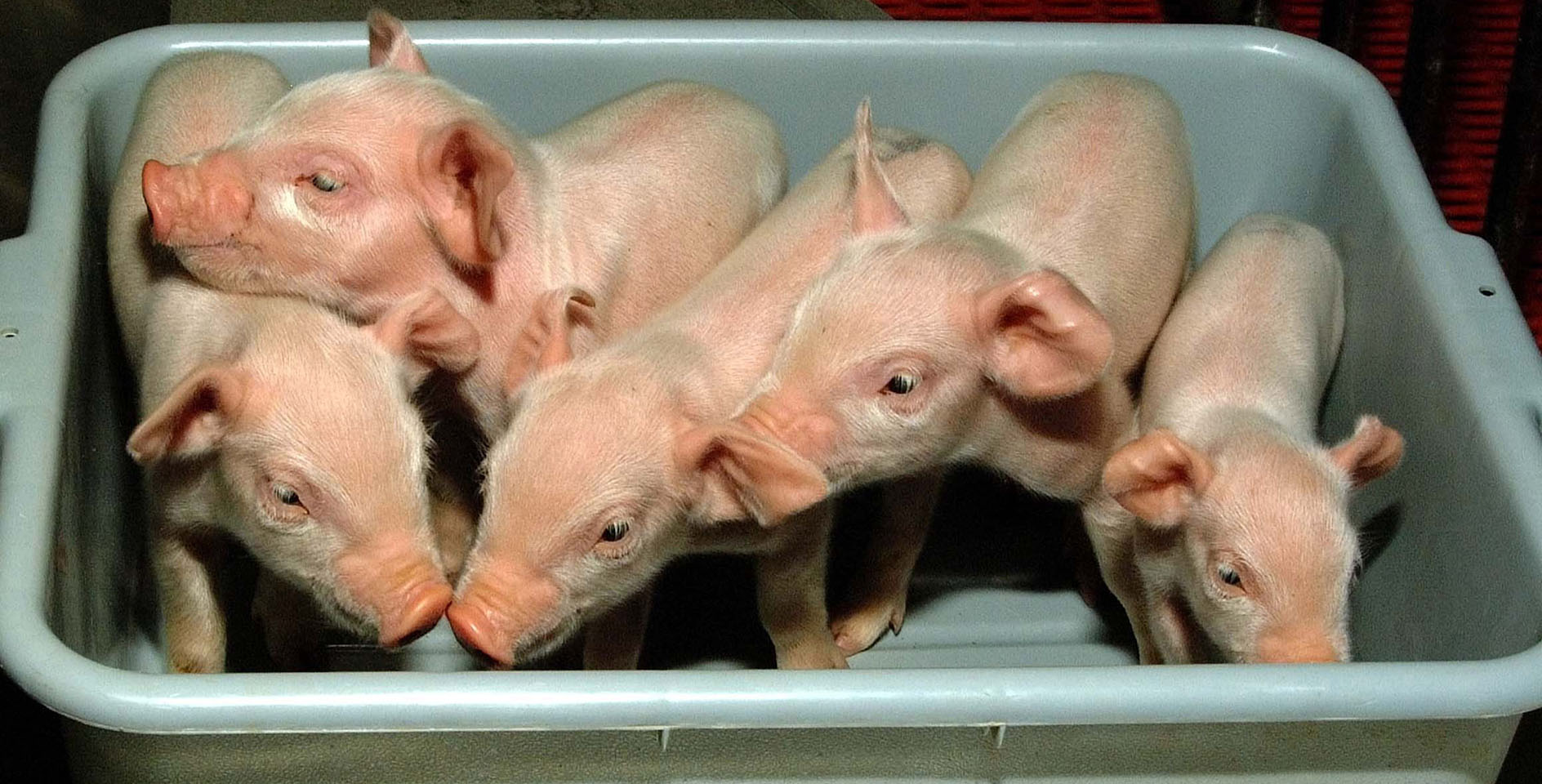Pig-to-human transplants sounds like science fiction, but actual occurrences of this experimental treatment were in medical news earlier this year. The field is known as xenotransplantation and refers to any sort of cross-species transplant. While there have been documented attempts at xenotransplantation as far back as the 17th century, with advancements in medicine and science in the modern era, xenotransplantation has become a reality with clinical trials of solid organs (e.g., kidneys; hearts) likely to take place soon. Christians should think carefully through the ethical issues this aspect of the medical world brings to the forefront.
Why are pigs being used in humans?
The demand for human organs for transplant always outpaces their supply. In the United States alone there are over 100,000 persons waiting on an organ. The vast majority of these are waiting on a kidney, where the median wait time is about 3.5 years. Many patients will die from end-stage organ failure or other complications before they ever receive a transplant. To help mitigate this disparity, alternative sources of organs have been experimented with for decades.
One alternative source that has shown a lot of promise in pre-clinical trial studies is genetically-altering pigs in order to make their organs more compatible for human use. Other animals have been considered, and xenotransplants have been attempted with them. A famous case—known as Baby Fae—took place in 1984. An infant only days old with a severe heart abnormality received a baboon heart. The child would die three weeks post-transplant from organ rejection. Since then, the primary model for solid organ xenotransplantation has shifted from primates to pigs for several reasons, including the large litter size of pigs, the size of pig organs that are roughly compatible with humans, the lesser risk of infectious disease transfer, and many persons seem to have less issue with using pigs than primates—though the use of pigs is still contested.
What are the latest advancements in xenotransplantation?
Xenotransplantation has been primarily in pre-clinical trial stages for years. Researchers have been doing genetic alterations on the pig genome to make the organs more compatible with humans. Without these modifications of the pig genome then, even with immunosuppressant medication, it is likely that hyperacute rejection would soon occur—a process in which the body thinks something is foreign and attacks it. In addition to genetic modifications, work has been ongoing on novel immunosuppressant therapy as well as experiments that place the genetically-altered pig organs into other mammals, such as baboons, to see how they respond.
In the fall of 2021, New York University (NYU), under the leadership of Robert Montgomery, transplanted a pig kidney into a human recipient that had been declared deceased by brain death criteria. Then they did it again about two months later.1Montgomery RA, Stern JM, Lonze BE, et al. Results of Two Cases of Pig-to-Human Kidney Xenotransplantation. N Engl J Med. 2022;386(20):1889-1898. Shortly after the first transplant at NYU, Jayme Locke and her team at the University of Alabama at Birmingham (UAB) transplanted two kidneys from a genetically-altered pig into a brain-dead human.2Porrett PM, Orandi BJ, Kumar V, et al. First clinical-grade porcine kidney xenotransplant using a human decedent model. Am J Transplant. 2022;22(4):1037-1053. Both research teams reported that the kidneys seemed to function fairly well, and there was no sign of hyperacute rejection.
While the kidney transplants in brain-dead humans were a step forward for xenotransplantation, a giant leap would follow. The University of Maryland Medical Center (UMMC) would stun the transplant community when they announced in early January 2022 that they had successfully transplanted a pig heart into a living human.3Kotz D. UM Medicine Performs Historic Xenotransplantation. https://www.umaryland.edu/news/archived-news/january-2022/um-medicine-performs-historic-xenotransplantation.php. Published 2022. Updated January 11, 2022. Accessed January 12, 2022. The patient—David Bennett, Sr.—was reportedly not a candidate for a human heart. UMMC had a longstanding research program into pig heart transplantation and researchers at UMMC asked the U.S. Food and Drug Administration for emergency authorization to allow them to transplant a pig heart into Bennett. He would live for over 8 weeks4Rothblatt M. Commentary on achievement of first life-saving xenoheart transplant. Xenotransplantation. 2022:e12746. before dying from what some have suspected to be a virus that was transferred to him from the pig heart.
What are the ethical issues involved in xenotransplantation for Christians to be aware of?
While allotransplantation (human-to-human transplants) has been written on from a Christian perspective for decades (Helmut Thielicke, Paul Ramsey, and Gilbert Meilaender to name a few), Christian writings on xenotransplantation are sparse. The Catholic Church’s Pontifical Academy for Life has developed perhaps the most comprehensive theological viewpoint on the subject that would likely resonate with many Protestant Christians. Additional symposia and focus groups have been conducted with academic theologians and clergypersons alike,5Hurst DJ, Padilla LA, Cooper DKC, Paris W. Factors influencing attitudes toward xenotransplantation clinical trials: a report of focus group studies. Xenotransplantation. 2021:e12684. 6Paris W, Seidler RJH, FitzGerald K, Padela AI, Cozzi E, Cooper DKC. Jewish, Christian and Muslim theological perspectives about xenotransplantation. Xenotransplantation. 2018;25(3):e12400.and there has been a small number of empirical studies looking at how religious persons view xenotransplantation.
From my perspective, the most glaring ethical issues with xenotransplantation that we need to think through from a theological perspective are 1) the use of animals as a supply of organs, and 2) the potential risk of infectious disease and how this may impact those who receive a pig organ and the wider public. Each of these two items has many subpoints that will be explained.
The proper use of animals for the benefit of humans has long been the subject of deliberation. In the Genesis creation account, God states, “Let us make man in our image, after our likeness. And let them have dominion over the fish of the sea and over the birds of the heavens and over the livestock and over all the earth and over every creeping thing that creeps on the earth” (Gen. 1:26, ESV). From this account, it seems unquestionable that God gives humankind dominion over other living things, yet what this dominion entails has been subject to interpretation.
Scripture reveals that God allows animals to be used for the benefit of humans in a variety of ways, including as food (Gen. 9:3), clothing (Gen. 3:21), and for labor that benefits humankind (Exo. 23:12). The term stewardship is often used when Christians think through their relationship to the created world, including animals (i.e., God has appointed humans as stewards over his creation). While in the garden of Eden prior to sin entering the human realm, Adam’s role in the garden is “to work it and keep it” (Gen. 2:15). A conventional interpretation of this implies that humans (Adam, in particular) are given a leadership role over God’s created role to prepare it, guard it, and protect it. King David tells us that all of creation is God’s: “The earth is the LORD’s and the fullness thereof, the world and those who dwell therein” (Psa. 24:1). All of creation is the Lord’s, and he has given a leadership role over his creation to humans, a delegation of authority to steward the world, its resources, and the living creatures within.
How should we think about xenotransplantation?
With these items in mind, how then do we regard xenotransplantation? I will emphatically note that Christian liberty instructs that we can disagree over the conclusions we draw from what it means to be stewards of God’s created world. Yet, I think there is a convincing argument that as God has granted dominion over the created world to humans, and as humans are meant to steward those resources well, then xenotransplantation may fit within this framework if we maintain certain parameters.
First, Christian doctrine affirms that humans are the only beings created in God’s image and, by bearing that image, they occupy a place of importance in the created order that animals do not. Humans are the ultimate work of creation. As the pinnacle of creation, some have taken this to mean that humankind can do anything they please with other created entities (e.g., the environment, animals). This would be a misinterpretation of what it means to be a steward of the resources God has given to humankind. Surely abuses have occurred in the past and present in the name of so-called exercising dominion, but acting in God’s image means—in part—that we are to mirror his goodness for creation. Christians can differ in how we apply certain aspects of dominion, such as what sound environmental policy might entail, but seeing the created world as merely at the disposal of humans and to be used in any conceivable way would be mistaken.
While we must not make the mistake of seeing the created as ours to be exploited, one purpose of the created world is for the use—even the flourishing—of humanity. I am sensitive to those who have hesitations about explicitly breeding a genetically altered species of pigs solely for the purpose of using their organs to meet human needs. Yet, we similarly breed species of animals for other purposes: for sport, for work, for food, for companionship. These activities, it could be argued, are for human flourishing. Hence, if we deem it acceptable to promote the use of animals for these purposes, then it does not seem that using an animal for xenotransplantation is entirely dissimilar. This is not to say we still do not try to promote such activities within the confines of what is ethical (e.g., try to reduce animal suffering; reduce the number of animals needed if possible), but there does not seem to be anything explicitly unethical about the use of animals for the purpose of xenotransplantation if we accept the use of animals for certain other purposes.
Second, one risk of xenotransplantation that has been known for decades is xenozoonotic infection. That is, the risk that the nonhuman organ may contain an infectious disease, such as a virus, that could infect the human that receives the nonhuman organ. It is then plausible that such an infection could spread to other close contacts and become a public health concern. As it was recently reported that the pig heart transplanted into the patient at UMMC was infected with a pig virus, this is a serious issue. Steps have been taken to reduce the risk of a xenozoonotic infection being transferred from a pig to a human, such as research protocols aimed at supplying pathogen-free porcine specimens (i.e., in how they’re raised/prepared), as well as developing highly sensitive molecular diagnostic panels to screen xenotransplant material for a wide range of infectious agents immediately prior to the transplant procedure.
However, even with this mitigation the risk still exists, and the true level of this risk is uncertain. Every day, we accept some level of risk for ourselves and those around us. We drive our cars and are accepting risk. If we have passengers—children, especially—we are accepting a risk for them, as they cannot consent to that risk. I bring up the aspect of “risk” because as Christians we are called to love our neighbors. Jesus speaks of the greatest commandments being to love him and love our neighbor. Accepting a nonhuman organ carries the risk of becoming infected with a pig virus and then possibly exposing others (our neighbor) to that risk—a risk they did not consent to accept. From an ethical perspective, even apart from the question of how Christians might view xenotransplantation, the risk of infectious disease is likely the most looming ethics issue facing this new therapy. In one sense, putting our neighbor at some risk is unavoidable in this world. More work certainly needs to be done to ensure that the pigs used for xenotransplantation are pathogen-free, which would undoubtedly ease the minds of many.
In short, xenotransplantation does present ethical challenges, but none seem outright insurmountable. The largest ethical issue facing xenotransplantation is the risk of potential infectious disease and what this may entail. For instance, some proposals call for xenograft recipients to be monitored for infectious diseases for the remainder of their lives. This seems difficult for both the study sponsor and the graft recipient to realize. The constant risk of spreading an infectious disease to loved ones (at least until the scientific community can be certain their source pigs are indeed pathogen-free) is a glaring issue and one that Christians may not want to assume currently.
Acknowledgment: I want to thank long-time friend Scott James, MD for reading an early draft of this article and offering many helpful comments.
Potential conflicts of interest: DJH is a paid consultant to a working group on ethical and social viewpoints of xenotransplantation at NYU.









